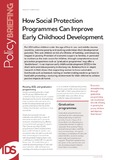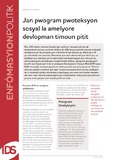How Social Protection Programmes Can Improve Early Childhood Development
Jan pwogram pwoteksyon sosyal la amelyore devlopman timoun pitit
| dc.contributor.author | Roelen, Keetie | |
| dc.coverage.spatial | Haiti | en |
| dc.date.accessioned | 2019-03-20T10:19:51Z | |
| dc.date.available | 2019-03-20T10:19:51Z | |
| dc.date.issued | 2019-03-20 | |
| dc.identifier.citation | Roelen, K. (2019) 'How Social Protection Programmes Can Improve Early Childhood Development', IDS Policy Briefing 167, Brighton: IDS | en |
| dc.identifier.citation | Roelen, K. (2019) 'Jan pwogram pwoteksyon sosyal la amelyore devlopman timoun pitit', Enfòmasyion Politik IDS la 167, Brighton: IDS | ht |
| dc.identifier.issn | 1479-974X | |
| dc.identifier.uri | https://opendocs.ids.ac.uk/opendocs/handle/20.500.12413/14418 | |
| dc.description.abstract | For 250 million children under the age of five in low- and middle-income countries, extreme poverty and stunting undermines their developmental potential. This puts children at risk of a lifetime of hardship, and remaining trapped in poverty. Provision of economic support to families, in particular to mothers as the main carers for children, through comprehensive social protection programmes such as ‘graduation programmes’ may offer a ‘double boon’: it can improve early childhood development (ECD) in the short term and reduce poverty in the long run. Evidence from in-depth research in Haiti shows that supporting women to have sustainable livelihoods such as livestock rearing or market trading needs to go hand in hand with promoting a nurturing environment for their children to achieve positive impacts all round. | en |
| dc.description.abstract | Pou 250 milyon timoun ki poko gen senk an nan peyi pòv ak sak mwayenman pòv yo, povrete ekstèm ak difikilte pou grandi menase potesyèl devlopman yo. Sa presante yon risk ki ka fè lavi timoun yo difisil epi ki fè yo rete bloke nan povrete. Pwovision yon sipò ekonomik pou fanmi yo, en patikilye pou manman yo ki represante prensipal swayan pou timoun yo, atravè pwogram pwoteksyon sosyal konplè tankou ‘pwogram gradyasyon’ ka ofri yon ‘doub wol’: li ka ni amelyore Devlopmant Timoun Pitit (DTP oswa ECD an anglè) nan lavni pwoch ni redwi povrete nan pi long tan an. Prèv ki sòti nan pwofon rechèch ann Ayiti montre ke sipòte fanm yo ak kondisyon de vi soutenib tankou elve betay oswa bagay pou vann nan mache, beswen ale men-nan-men ak pwomosyon yon anviwònman ankourajan pou timoun yo pou sa ka genyen yon enpak positif pi total. | ht |
| dc.description.sponsorship | British Academy | en |
| dc.description.sponsorship | UK Department for International Development | en |
| dc.language.iso | en | en |
| dc.publisher | IDS | en |
| dc.relation.ispartofseries | IDS Policy Briefing;167 | |
| dc.rights | This is an Open Access briefing distributed under the terms of the Creative Commons Attribution 4.0 International licence (CC BY), which permits unrestricted use, distribution, and reproduction in any medium, provided the original authors and source are credited and any modifications or adaptations are indicated. http://creativecommons.org/licenses/by/4.0/legalcode | en |
| dc.rights.uri | http://creativecommons.org/licenses/by/4.0/ | en |
| dc.subject | Children and Youth | en |
| dc.subject | Gender | en |
| dc.subject | Social Protection | en |
| dc.title | How Social Protection Programmes Can Improve Early Childhood Development | en |
| dc.title | Jan pwogram pwoteksyon sosyal la amelyore devlopman timoun pitit | ht |
| dc.type | IDS Policy Briefing | en |
| dc.rights.holder | IDS | en |
| dc.identifier.team | Rural Futures | en |
| rioxxterms.funder | Default funder | en |
| rioxxterms.identifier.project | Default project | en |
| rioxxterms.version | VoR | en |
| rioxxterms.funder.project | 9ce4e4dc-26e9-4d78-96e9-15e4dcac0642 | en |
Files in this item
This item appears in the following Collection(s)
-
IDS Research [1671]
Except where otherwise noted, this item's license is described as This is an Open Access briefing distributed under the terms of the Creative Commons Attribution 4.0 International licence (CC BY), which permits unrestricted use, distribution, and reproduction in any medium, provided the original authors and source are
credited and any modifications or adaptations are indicated. http://creativecommons.org/licenses/by/4.0/legalcode



